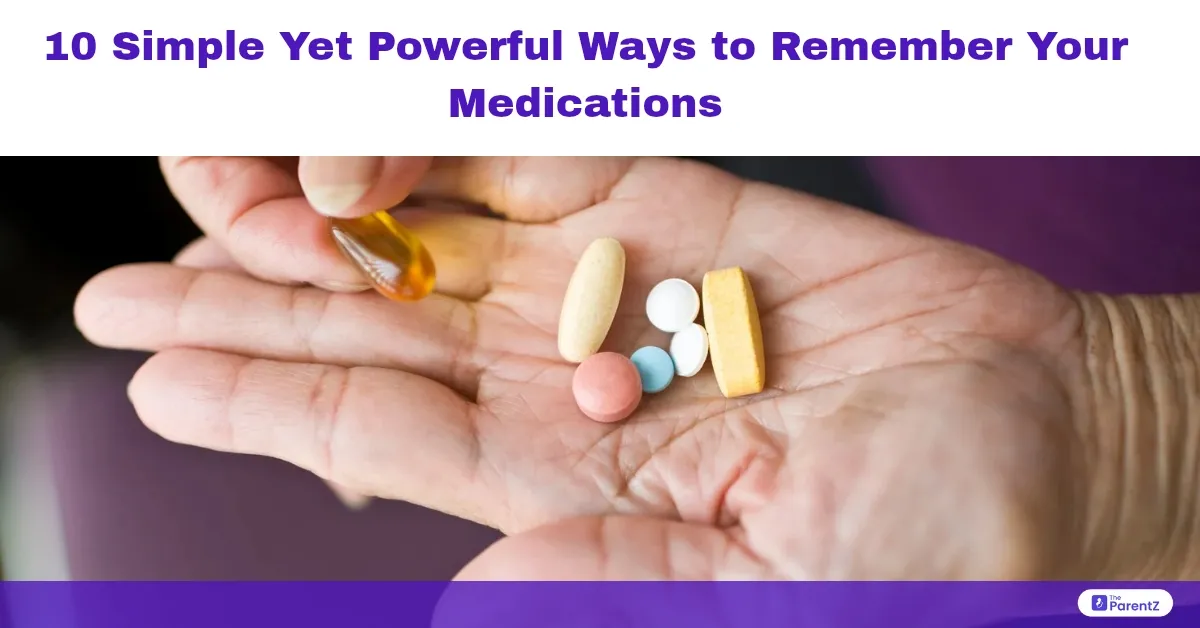Have you ever found yourself standing in front of the medicine cabinet, wondering if you took your morning pills? Or maybe you've been in a rush and accidentally grabbed the wrong bottle? You're not alone! Forgetting medications or making mistakes with them is more common than you think, and it can happen to anyone—whether you're managing your own health or taking care of your kids.
Let's face it: life gets busy, and sometimes our brains just can't keep up. However, forgetting to take your medications or taking them incorrectly can have serious consequences. So, here are ten practical and creative strategies to help you stay on track and avoid those pesky medication mistakes.
#1. Set Daily Reminders on Your Phone
We all have our phones glued to our hands, so why not use them to our advantage? Set recurring alarms for each medication, and label them clearly so you know exactly what you're taking. Apps like TheParentZ Baby Growth & Health Tracker, Medisafe, or Pill Reminder can also send you reminders and track your doses. This way, you'll never miss a pill again, even on the most chaotic days.
- Pro tip: If you often ignore alarms, try using unusual alarm sounds specifically for medication reminders. Your brain will start associating that unique sound with "take medicine."
#2. Pair Pill Time with a Daily Habit
Think about your daily routine: do you always have coffee in the morning or brush your teeth before bed? Linking your medication routine to these habits can make it feel more automatic. For example, take your morning meds while you're brewing coffee or right after brushing your teeth at night. It's a simple trick that works wonders!
#3. Use a Pill Organizer
Pill organizers are lifesavers! They have separate compartments for each day of the week, so you can see at a glance if you've taken your meds. Some even come with alarms or color-coded sections for morning, afternoon, and evening doses. This is especially helpful if you're managing multiple prescriptions or have varying dosages throughout the day.
- Pro tip: After filling your pill organizer, take a photo with your phone. If you ever wonder, "Did I take my medicine?" you can compare what's left to your photo.
#4. Create a Medication Calendar
A calendar might sound old-school, but it's incredibly effective. Mark off each dose as you take it and include reminders for when you need to refill your prescriptions. You can use a physical calendar or go digital—whatever works best for you. This method is great for keeping track of multiple medications and ensuring you never miss a dose.
#5. Keep a Complete Medication List
Make a master list of all your medications, including:
- Name of medication
- Dosage
- What it's for
- When to take it
- Special instructions (with food, on an empty stomach, etc.)
- Possible side effects
- Your doctor's name and contact information
Keep this list handy—on your fridge, in your wallet, or saved on your phone. It's a lifesaver during doctor visits or emergencies, and it helps prevent mistakes like taking the wrong pill.
- Pro tip: Update this list immediately whenever there's a change and share it with a trusted family member.
#6. Simplify Your Medication Routine
If possible, talk to your doctor about simplifying your regimen. Ask if there are combination pills available or if you can switch to once-daily dosing. The fewer pills you have to take, the less likely you are to forget or mix them up.
#7. Use Visual Cues
Place sticky notes in visible spots like your bathroom mirror or fridge as reminders to take your meds. You can also use colored labels on your pill bottles—blue for morning, red for afternoon, and yellow for evening—to make things easier. Sometimes, a little visual reminder is all we need.
#8. Involve Family or Friends
If you're caring for someone or need a little extra help yourself, don't be afraid to involve others. Share your medication schedule with a trusted friend or family member who can check in with you daily or weekly. It's amazing how much of a difference having someone to remind you can make.
#9. Try the "Flip the Bottle" Method
This simple trick works well if you take medication once daily. After taking your dose, flip the bottle upside down. The next day, flip it right-side up after taking your dose. If you can't remember if you've taken your medication, the position of the bottle will tell you.
- Pro tip: This works best for medications in distinctive bottles that won't spill when flipped.
#10. Turn It into a Reward System
Connect taking your medication with something enjoyable. Maybe you only get to watch your favorite show after taking your evening pills, or you reward yourself with a small treat after taking your medication for a full week without missing a dose.
- Pro tip: Use stickers on a calendar to mark successful days - it's simple but surprisingly satisfying!
Staying Safe: Essential Tips
Medication management isn’t just about remembering doses—it’s also about handling them safely to avoid harm:
- Store medications properly: Keep them away from heat, light, and moisture (bathroom cabinets are not ideal). Use cool, dry places like kitchen counters away from stoves or sinks.
- Follow instructions: Always store medicines as directed by your doctor or pharmacist.
- Never stop medications abruptly: Talk to your healthcare team before making changes.
- Don’t crush or split tablets without advice: Some pills must be swallowed whole.
- Avoid sharing medications: What works for you could be harmful—even deadly—for someone else.
- Check before taking new OTC drugs: Ask if they’ll interfere with your prescriptions.
- Simplify routines if needed: Your pharmacist can help reduce the number of daily doses.
Conclusion
Remember, nobody's perfect. Even with the best systems, you might occasionally miss a dose. If this happens, don't panic - check the medication instructions or call your pharmacist for advice rather than doubling up on doses.
The most important thing is finding what works for YOU. Try different methods until you find the right combination that helps you stay on track with your medications and keep yourself healthy.








Be the first one to comment on this story.